What Are The 7 HoT Modules?
Module #1: Digital Literacy
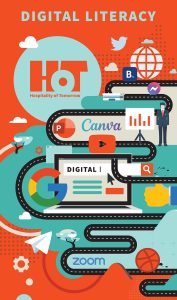 The module provides the basic and essential knowledge and digital skills that HoT Students need in their daily personal and professional life. The module will include topics like online communication tools and ethics, productivity & collaboration tools, digital literacy and other similar topics.
The module provides the basic and essential knowledge and digital skills that HoT Students need in their daily personal and professional life. The module will include topics like online communication tools and ethics, productivity & collaboration tools, digital literacy and other similar topics.
Linaster is teaching the Digital Literacy. Linaster is a digital tasks outsourcing company and is servicing clients from different countries via a pool of trained virtual assistants. Linaster is also a producer of online courses on digital tools and skills. Linaster is co-founded by 2 successful freelancers and entrepreneurs – Arpine Grigoryan and Lilit Khachikyan.
Module #2: Communication Literacy
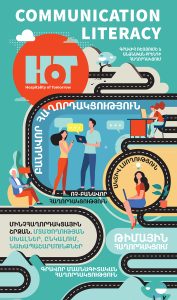 The module is a hands-on training covering effective verbal and non-verbal communication techniques within a team, presentation creation, personal branding, as well as the subject of story-telling in a business setting. The training includes video and audio materials, activities, a communication game, milestone assignments and a final story to be written by participants in groups, and presented to the audience.
The module is a hands-on training covering effective verbal and non-verbal communication techniques within a team, presentation creation, personal branding, as well as the subject of story-telling in a business setting. The training includes video and audio materials, activities, a communication game, milestone assignments and a final story to be written by participants in groups, and presented to the audience.
Module #3: Communication In A Foreign Language
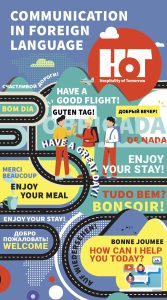 In this module students are taught according to their English proficiency level which is checked individually before starting the course. The module provides an insight of the scope of the hospitality industry, introduces the different sectors in the industry, the opportunities available, and provides a preliminary training necessary to achieve a career in the hospitality industry.
In this module students are taught according to their English proficiency level which is checked individually before starting the course. The module provides an insight of the scope of the hospitality industry, introduces the different sectors in the industry, the opportunities available, and provides a preliminary training necessary to achieve a career in the hospitality industry.
Republic LLC is teaching the Communication in Foreign Language. Republic LLC was founded in 2022 in the Republic of Armenia. This is a large specialized family of language schools, which today represents the uRepublic brand specializing in teaching English on an online platform.
Module #4: Financial Literacy
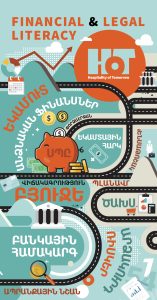 The module intends to acquaint the participants with economics concepts used in everyday life providing accessible theoretical knowledge and ways of their practical application in the Republic of Armenia. At the end of the module, students will master the fundamental principles of economics, make a personal budget and financial planning, perform simple economic calculations and have an understanding about different types of financial organizations, learn about the new tools of the financial world and their philosophy, apply economic tools, read and understand economic statistics.
The module intends to acquaint the participants with economics concepts used in everyday life providing accessible theoretical knowledge and ways of their practical application in the Republic of Armenia. At the end of the module, students will master the fundamental principles of economics, make a personal budget and financial planning, perform simple economic calculations and have an understanding about different types of financial organizations, learn about the new tools of the financial world and their philosophy, apply economic tools, read and understand economic statistics.
Module #5: Legal Literacy
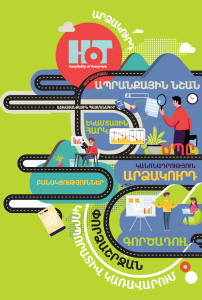 The module introduces to labor relationships: conclusion of employment contract, probationary period, rights and responsibilities of an employer and employees. The module also includes topics on the legal basis of business activities, introduction of the Armenian tax system, types of taxes, principles of corporate relationships, etc.
The module introduces to labor relationships: conclusion of employment contract, probationary period, rights and responsibilities of an employer and employees. The module also includes topics on the legal basis of business activities, introduction of the Armenian tax system, types of taxes, principles of corporate relationships, etc.
Justus Legal Consulting is teaching the module. Justus Legal Consulting is a law firm providing a full spectrum of services for profit and non-profit companies and individuals specializing in financial law, corporate law, IP law and civil litigation.
Module #6: Hospitality Fundamentals
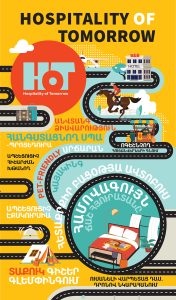 This module will provide practical knowledge about the hospitality sector and its sub-sectors, mainly related to hotel and restaurant management and entertainment (experiential) industry. The module shares the experiences of reputable professionals and established businesses. It will assist HoT Students in developing a touristic product, start or develop their business in the hospitality sector, and improve their skills as potential employees in hospitality. Interactive and face-to-face sessions will be available.
This module will provide practical knowledge about the hospitality sector and its sub-sectors, mainly related to hotel and restaurant management and entertainment (experiential) industry. The module shares the experiences of reputable professionals and established businesses. It will assist HoT Students in developing a touristic product, start or develop their business in the hospitality sector, and improve their skills as potential employees in hospitality. Interactive and face-to-face sessions will be available.
ArmenTrip is teaching the Hospitality Fundamentals.Armentrip is a tour operator. Since it’s incorporation in 2014 it has received more than 2000 groups in Armenia and has a 30% of loyal customer base, who return to Armenia for the third or fourth time.
Module #7: Entrepreneurship Literacy
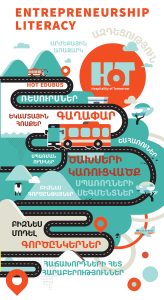 This hands-on Entrepreneurship module consists of intensive work on HoT Student’s business ideas. It includes creating teams, theorizing about the problems that need to be solved, what those solutions are, how to fit them into the preferences coordinates of potential customers, who those customers are, how many are they, and what would make them buy the solution. The participants will be also planning their operations, calculating costs and expected revenues, thinking about partners, or people who will be helping them with their resources and their networks, and would be boldly thinking about resources they already have and would be ready to invest in their business ventures.
Students will be planning their sales channels and their marketing strategies, with the purpose of taking their prototypes to the market, to test them in real life, and come back together to modify them to meet the customers’ needs. Special attention will be paid to solutions to social problems – social entrepreneurship business models would be addressed as well.
This hands-on Entrepreneurship module consists of intensive work on HoT Student’s business ideas. It includes creating teams, theorizing about the problems that need to be solved, what those solutions are, how to fit them into the preferences coordinates of potential customers, who those customers are, how many are they, and what would make them buy the solution. The participants will be also planning their operations, calculating costs and expected revenues, thinking about partners, or people who will be helping them with their resources and their networks, and would be boldly thinking about resources they already have and would be ready to invest in their business ventures.
Students will be planning their sales channels and their marketing strategies, with the purpose of taking their prototypes to the market, to test them in real life, and come back together to modify them to meet the customers’ needs. Special attention will be paid to solutions to social problems – social entrepreneurship business models would be addressed as well.
